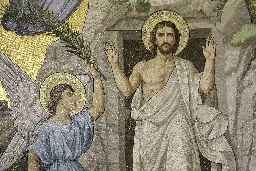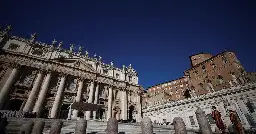-
Christianity Was Always for the Poor (David B. Hart, Jacobin)
jacobin.com Christianity Was Always for the PoorFrom the Sermon on the Mount through the Apostolic Age, the first Christians preached against wealth.

cross-posted from: https://lemmy.world/post/14386046
> Christianity Was Always for the Poor (David B. Hart, Jacobin)
-
Episcopal/Anglican Lemmings?
Hey, folks, I was just curious if there were any Episcopal (USA) lemmings around here? I've recently begun attending a small episcopal church, after having not been to church since the pandemic began. Before that, I'd only been to church a few times in the last couple decades. I've been really enjoying the episcopal church, and while my own personal belief system isn't 100% in line with theirs, they're one of the closest groups to my own thinking.
I liked the episcopal subreddit before I left that site, and was wondering if anyone has any interest in making a Lemmy community, or if there was one I'm not familiar with.
- www.reuters.com Transgender people can be baptized Catholic, serve as godparents, Vatican says
Transgender people can be godparents at Roman Catholic baptisms, witnesses at religious weddings and receive baptism themselves, the Vatican's doctrinal office said on Wednesday.

-
What happened in Noah’s tent?
How would you react if you found out a family member walked in on you and saw you naked while you were passed out drunk?
I imagine I would be embarrassed and would make a mental note to hold back on the beers next time.
Most characters on a sitcom would probably conclude that to restore balance to the relationship, they’d need to see their family member drunk and naked.
Apparently, Noah’s (yes, the same guy who built the ark) reaction is to curse his family member’s son, and all of his descendants.
Genesis 9 contains one of the most interesting stories I think you can find in the Old Testament. Regardless of whether you read this story as historical or legendary, it doesn’t feel like all the pieces in this story add up. The punishment does not seem to fit the crime. For many readers, we’re left wondering: what exactly happened in Noah’s tent?
Reading 1
The first possibility is that what’s written in the text is really all there is to it. Noah gets drunk on home-brewed wine, falls asleep naked in his tent, and Ham (Noah’s son) goes in, sees Noah naked, and tells his brothers, who walk in backwards and place a blanket over their father. When Noah learns what Ham did, he curses - not his son Ham, but Ham’s son and Noah’s grandson - Canaan to be a slave to the descendants of his uncles.
It’s definitely possible that this is the full story, and for many modern readers, that’s the default reading of the text. But if that’s the case, it feels like Noah’s reaction is both unnecessarily harsh and misdirected. A lifetime of slavery for his grandson because his son caught a glimpse of his penis? Come on. But there are other interpretations of the text which choose to read between the lines a little bit more.
Reading 2
One ancient rabbinic reading of the text is that when Ham entered Noah’s tent, he didn’t just see his father naked - he sexually assaulted him. This certainly escalates the seriousness of Ham’s crime and makes Noah’s furious response a bit more warranted. However, it still feels misdirected. Why curse Canaan instead of Ham?
Reading 3
Another ancient rabbinic reading is that Ham actually castrated his father while he was drunk and unconscious. Yikes. Again, if this is the case, Noah’s anger is now warranted, and there’s a stronger reason for cursing Canaan rather than Ham. Canaan was Ham’s fourth son, and by castrating his father, Ham robbed Noah of his own fourth son. However, it feels to me like this reads heavily between the lines. There doesn’t seem to be any kind of euphemism indicating that this is the case.
Reading 4
A more modern reading of the story compares a verse in this story with a passage in Leviticus.
“And Ham, the father of Canaan, saw the nakedness of his father, and told his two brothers outside.” Genesis 9:22
“You shall not uncover the nakedness of your father's wife; it is the nakedness of your father.” Leviticus 18:8
Leviticus uses the same phrase found in Genesis as a euphemism to mean having sexual intercourse with your own mother. So, this reading concludes the Ham raped not his father but his mother while Noah lay drunk and unconscious. Again, this would make Noah’s anger more warranted, and could explain the curse on Canaan - if Canaan was born to Ham by his own mother.
What do you think? Do you buy any of these interpretations? Or do you think something else happened entirely?
-
The gospel in one sentence
If you were to try to boil the gospel message down to one sentence, what would it be?
For me, it’s: “Christ participates in our humanity so that we can partake in his divinity.”
-
What is sin?
I can still vividly recall my elementary Sunday school teacher teaching us a “kid-friendly” definition of sin:
Sin is anything you think, do, or say that makes God upset.
As a young child, this notion filled me with a sense of dread. What if I unintentionally said or did something that upset God? And for years this fear lingered because the reasons behind God's displeasure seemed more or less… arbitrary.
Traditional Western Christianity usually defines sin somewhere along the lines of transgression against the divine will. But what does the divine will entail? Are certain actions arbitrarily placed on a naughty list? Levitical laws, such as those prohibiting the mixing of fabrics or trimming beards, can contribute to this perception of arbitrariness.
But to me, the idea that sin is arbitrary ultimately means that there is not such thing as the Good, which I reject. So, I propose a different perspective — a perspective that views sin as dehumanization. I hold the belief that sin does involve transgression against the divine will, but that God's will is to redeem creation and restore true humanity, where every person bears the image of God.
For this reason, I propose that we can assess an act's sinfulness by examining whether it humanizes or dehumanizes individuals.
Let's consider examples: Acts of compassion, empathy, and justice affirm the dignity and worth of others, nurturing their humanity. In contrast, actions rooted in prejudice, discrimination, or oppression strip away the humanity of others, dehumanizing them.
Now, some people may prefer to view sin through the more “objective” lens of biblical commandments over the subjectivity of humanizing vs dehumanizing acts. However, I am confident that viewing sin through the lens of dehumanization brings us closer to the divine will, because we acknowledge the transformative power of our actions and our responsibility to foster the flourishing of all.
By embracing an understanding of sin as dehumanization, we embrace the ideals of justice, love, and the restoration of our shared humanity.
-
Indigenous Peoples Day
To say that the Christian church has a checkered past with the indigenous people of North America would be putting it lightly. Inter-generational trauma caused by the church lingers in many indigenous communities today.
As a non-indigenous Christian living on treaty land, I want to take this opportunity to say a few things.
First, the actions of many members of the church towards indigenous people - both historically and today - have been nothing short of abusive, spiritually, emotionally, and physically. To deny that is to perpetuate a cycle of abuse. The church has largely failed to serve as a representative of Christ to indigenous people.
Second, I believe that the Christian church has much to learn from the spiritual practices of our indigenous neighbours. While I personally hold to the belief that Jesus Christ is the only image of the invisible God, I also believe that there is a multitude of ways of pursuing God. In particular, I believe that many indigenous communities depict a far more Christlike vision of communal, self-sacrificial life. In addition, I believe that the relationship indigenous peoples have with nature is much closer to the idyllic picture of Adam and Eve’s stewardship of creation than most western cultures.
So today, I acknowledge that I live on treaty land, the traditional and ancestral home of the Cree, Dene, Blackfoot, Saulteaux, and Nakota Sioux. I choose to honour the lives and stories of the indigenous peoples who came before me. And I claim my responsibility to foster healthier relationships with my indigenous neighbours today.
-
That all shall be saved
Some verses from “that all shall be saved,” by David Bentley Hart, in support of universal salvation:
Romans 5:8-19 | So, then, just as through one transgression came condemnation for all human beings, so also through one act of righteousness came a rectification of life for all human beings; for, just as by the heedlessness of the one man the many were rendered sinners, so also by the obedience of the one the many will be rendered righteous.
Titus 2:11 | For the grace of God has appeared, giving salvation to all human beings …
Matthew 18:14 | So it is not a desire that occurs to your Father in the heavens that one of these little ones should perish.
1 John 2:2 | And he is atonement for our sins, and not only for ours, but for the whole cosmos.
1 Timothy 4:10 | we have hoped in a living God who is the savior of all human beings, especially those who have faith.
-
In response to the SBC’s decision to expel churches led by women
www.nytimes.com Southern Baptists’ Fight Over Female Leaders Shows Power of Insurgent RightMoves this week to oust women from church leadership in the nation’s largest Protestant denomination offer an early look into the psyche of evangelical America ahead of 2024.

I’m a Canadian, so all of this has been happening at a distance for me. That being said, my heart breaks for all the people affected by this decision.
Holding to male-only leadership as being ordained by God has become an untenable perspective: biblically, logically, and experientially.
First, let’s ask the question - assuming that male-only leadership is God’s will - is there a functional difference between men and women which justifies this hierarchy?
If no, then we are left with the conclusion that God has arbitrarily created a hierarchical division between humanity. Personally, I don’t see how one can defend this view in light of the major biblical theme of equalization - that hills will be made low and valleys filled in, the wise will become foolish, and the foolish will be made wise.
If yes, then this functional difference must be in their ability to lead. If it’s anything else (e.g., the quality of having a penis), then it’s the same as being arbitrary.
So then, are women incapable of leadership?
It seems impossible to me to answer “yes” to this question. Clearly, there are plenty of women with the ability to lead. To deny that is ignorance.
Obviously, women are capable of leadership.
Of course, proponents of male-only leadership may argue that, on the whole, men are typically better at leadership than women, just as men are generally taller than women, though not every man is taller than every woman. But this completely breaks down, because it means that gender isn’t the difference after all - it’s simply ability. And if this is the case, then regardless of generalizations, individuals with the ability to lead should lead, whatever their gender.
There is no Jew or Greek, slave or free, male and female; since you are all one in Christ Jesus.
-
Happy Father’s Day!
To all of you who are fathers: I wish you the best today! And for those of you who have complicated/toxic relationships with your fathers: my thoughts are with you. ❤️ I know that this can be a tough day.
-
Deconstruction & Life Rafts
I once heard somebody talk about how one of the big reasons deconstruction can be scary is that it feels like you have to let go of all your beliefs at once, which is an extremely difficult thing to do. He talked about how we chose one core belief to be his “life raft” and gave himself permission to question everything else, but to accept this one thing at face value.
As I’ve deconstructed, my life raft has been that God is love, and that Jesus is God incarnate. It was incredible to me how much easier it became to process the rest of my questions when I had permission to just accept and believe that Jesus is the God who loves us.
Has anyone else heard of this idea? If so, or if not, what is/would be your life raft?
-
Reading the Bible
I’m interested to know how other people approach reading the Bible, and what it means to read the Bible well.
For me, reading the Bible well means reading in context, as revelation, for Christ, through the Holy Spirit, with the Church, from the margins, by faith.